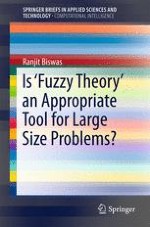
2016 | OriginalPaper | Chapter
Is ‘Fuzzy Theory’ an Appropriate Tool for Large Size Problems?
Author : Ranjit Biswas
Published in: Is ‘Fuzzy Theory’ an Appropriate Tool for Large Size Problems?
Publisher: Springer International Publishing
Activate our intelligent search to find suitable subject content or patents.
Select sections of text to find matching patents with Artificial Intelligence. powered by
Select sections of text to find additional relevant content using AI-assisted search. powered by